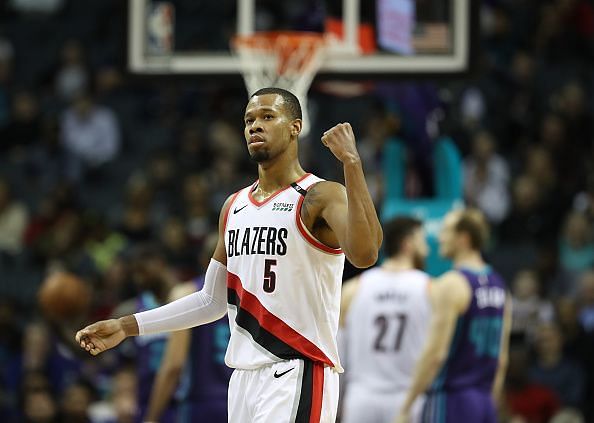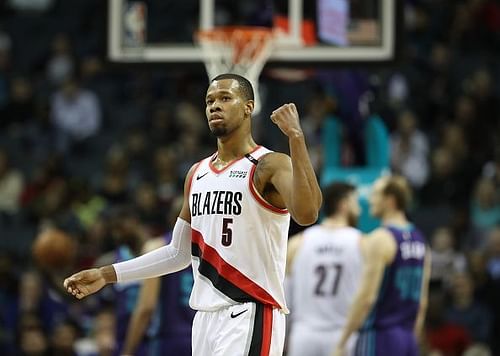
The Rodney Hood Experiment failed in Cleveland, why should it be any different in Portland?

Disclaimer: The opinions of the author do not reflect the views of Sportskeeda
Heading into the NBA trade deadline, Trail Blazers GM Neil Olshey knew that failure like last season was not an option. On the heels of an incredibly impressive season for the Portland Trail Blazers in 2017-18 that ended with a bitter sweep at the hands of the New Orleans Pelicans, a second disappointing playoff stint could mean several jobs lost and players traded out of “Rip City”.
Not just for Olshey and his Head Coach, Terry Stotts, but crafty role players and starters such as CJ McCollum, Seth Curry, and Al-Farouq Aminu might be those who would see themselves traded out of Portland if a second consecutive season of postseason disappointment ensued.
This led Olshey to end up making a flurry of moves including trading for Rodney Hood from the Cleveland Cavaliers, Skal Labissiere from the Sacramento Kings, and then capping it off, the Trail Blazers signed free agent Enes Kanter after he was waived by the New York Knicks.
While I agree with the Trail Blazers' sentiment to add pieces to this roster in an effort to challenge the seemingly slowly but surely internally collapsing Golden State Warriors, the additions of pieces like Hood and Kanter will not be enough to push Portland to a potential 7 game conference final showdown with the Warriors.
The player I want to examine is Rodney Hood. The fifth-year small forward out of Meridian, Mississippi has had a bit of an underwhelming career based on his potential thus far, and this season has really been no different.
After an impressive redshirt sophomore season at Duke University where Hood averaged 16/4/2, Hood declared for the 2014 NBA Draft and was selected with the 23rd overall pick by the Utah Jazz.
After an injury-ridden rookie season in which Hood played in just fifty games, he came back the following season in what has probably been his best overall season to date. In his 2nd season, Hood played in a career-high seventy-nine games for the Jazz starting all of them and averaging 14.5 PPG on 42% shooting overall including 36% from three-point range.
In Hood’s third season, he played in just fifty-nine games averaging 12.7 PPG on a similar 41% shooting with an improved 37% three-point shooting. Hood’s third season was also the first time that he made the playoffs. He played in 11 playoff games for the Jazz that season in a sixth-man role averaging only 9.0 PPG on an abysmal 35% shooting including just 26% from three-point range.
At this point, it was beginning to set in that Hood was no more than an inconsistent role player and any chance of him beginning an elite complementary player were growing fainter and fainter by the week.
Hood got off to a solid start in his 4th season averaging just under 17 PPG in thirty-nine games for the Jazz on 42% shooting including just under 39% shooting from three-point range. However, the Utah Jazz at this point seemed to have had enough of Hood and his inconsistencies, thereby trading him to the Cleveland Cavaliers on February 8th, 2018, in a three-team trade also involving the Sacramento Kings.
The Cavaliers, then in need of a replacement to carry the load that Kyrie Irving left on the franchise when he was traded to the Boston Celtics the previous summer, acquired pieces in Hood, Jordan Clarkson, George Hill, and Larry Nance Jr. They hoped that by an offense by committee, they would have enough offensive firepower to knock off the greatest offensive team arguably in basketball history in Kevin Durant and the Golden State Warriors.
For Hood, this was finally his chance to show the rest of the NBA his true potential playing on a LeBron James team who while not as good as they had been the previous 3 seasons, were still determined to make their 4th consecutive trip to the NBA Finals. This was Hood’s chance to prove all the doubters wrong that he could, in fact, be a consistent, reliable offensive player.
Unfortunately for Hood (and the Cavaliers), life does not have fairy tale endings for everyone. No matter how much we may want to root for someone to succeed, life is not always that generous. Sometimes, the reality with Hood was what the NBA had known for 4 years: that Rodney Hood is an unreliable, inconsistent offensive player.
In 21 regular season games with the Cavaliers during the 2017/2018 NBA season, Hood averaged just under 11 PPG on 44% shooting including 35% from three-point range. Solid, albeit a bit underwhelming given his potential.
Then came what has to easily be the worst period of Hood’s basketball career: the 2018 NBA Playoffs. During the 2018 playoffs which saw the Cavaliers make their 4th straight NBA Finals before being swept by the Warriors, Hood averaged just over 15 MPG for the Cavaliers, with an average of just 5 PPG on an abysmal 16.7% three-point shooting percentage.
Hood quickly fell out of the rotation for the Cavaliers in the playoffs as he struggled to consistently score during the early rounds of the playoffs, essentially not even playing during the first two games of the 2018 NBA Finals. He was also having issues with the Cavaliers coaching staff just leading to an overall awful environment for everyone involved.
Who's to say what happened to Hood after he was traded from Utah to Cleveland, leading him to struggle even more with finding consistency. Pressure? Nerves? Self-doubt? Regardless of whatever the reason was, there could be no more denying that Rodney Hood could not be relied upon to put up twenty-plus points every night for you as a consistent 2nd or even 3rd option on a championship hopeful team.
Flash forward to just a few weeks ago. Hood ended up agreeing to a 1-year contract to re-sign with the Cavaliers in a hope that he could prove himself this season in the hopes of securing a lengthy and handsomely paid contract next summer. The only question was, would any team contending for the title this season take the same risk that Cleveland did in the hopes of getting a consistent Hood to provide consistent scoring for them on offense during the postseason?
After averaging 12 PPG on 42% shooting including 36% from three-point range, the Portland Trail Blazers decided to bite the Cavaliers' fishing line on February 4th, 2019, in a trade that saw Hood go to the Trail Blazers in exchange for Wade Baldwin IV, Nik Stauskas, and two future second-round picks.
On paper, the Trail Blazers seem like as good a fit for Rodney Hood as any team potentially out there. Terry Storts, the Head coach of the Blazers, runs a free-flowing, heavy three-point shooting offense led by Damian Lillard, CJ McCollum, and Jusuf Nurkic.
For a team like Portland (much like Cleveland), it is difficult to attract star free agents to want to sign with them, being a mid-major market team, so trading for extra pieces is their best way to acquire talent; there is nothing wrong with that. However, I just feel that we have seen this experiment with Hood before.
It is not like the Jazz or the Cavaliers were flushed with offensive talents when Hood was on the roster. In fact, this Trail Blazers' team probably has the most talent offensively of any team that Hood has played for thus far in his NBA career. However, Hood has proven that he is not consistent enough to be a reliable offensive starter and the Trail Blazers already have enough offensive contributors off the bench now in the form of Seth Curry, Jake Layman, Enes Kanter, Zach Collins and Evan Turner.
While second-round picks are usually nothing more than future trade chip assets, and both Stauskas and Baldwin had found themselves completely out of Stotts' rotation, I do not think the addition of Hood raises the Trail Blazers from a team that I could see winning one playoff series to one that can challenge the Warriors' reign atop the Western Conference. I still believe today that Oklahoma City and Denver are better teams top to bottom than Portland.
While I admire the Trail Blazers' optimism, and a little bit of desperation to make sure that the embarrassment that they suffered last season will not repeat itself again this year, we have already seen the Rodney Hood experiment play out last season in Cleveland. He is not consistent enough of a player to be relied upon by a team with championship aspirations.